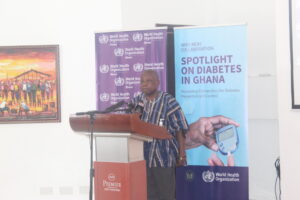[ad_1]

Ghana remains committed to ensuring the prevention and control of non-communicable diseases, Mr Kwaku Agyemang Manu, Minister for Health, has said.
The country he explained had developed the National NCD Policy and Strategy to provide policy guidance and strategies to prevent and control diabetes to exhibit the level of commitment.
The Minister said this on Friday at a World Health Organization and Ministry of Health collaboration with a spotlight on diabetes in Ghana.
It was on the theme: “Promoting Partnerships for Diabetes Prevention and Control.”
The Health Minister, noted that the surveillance systems of the country were currently being strengthened to ensure quality data capture and its utilization at all levels of the healthcare system to generate metrics and key indicators to inform policy and strategy.
“Medical devices such as glucometers, sphygmomanometers, and weighing scales have been provided at the primary healthcare level to support screening and diagnosis of non-communicable diseases,” he disclosed.
To fulfil that assurance, Ghana in April 2022, hosted the International Strategic Dialogue on Non-communicable Diseases (NCD) and the Sustainable Development Goals to raise the priority accorded to such diseases.
“Ghana signed on to the Global NCD Compact to accelerate efforts toward achieving SDGs 3.4 and 3.8 and also signed on to the WHO Global Diabetes Compact in response to the increasing burden of diabetes around the world.
The compact aims to reduce the global burden of diabetes by increasing access to affordable and quality care, promoting a more comprehensive approach to diabetes prevention and management, and addressing the social determinants of health that contribute to the diabetes epidemic.
Dr Francis Kasolo, Country Representative, WHO Ghana noted that globally, more than 500 million people are living with diabetes, of whom majority resided in low- and middle-income countries.
“This number is projected to increase by 80 percent by 2045 if nothing is done to
address the risk factors and drivers of these diseases,” he said.
In Africa, 24 million adults are currently living with diabetes, with that number predicted to swell by approximately 130 per cent to 55 million by 2045.
In Ghana, there is a national prevalence of between 6-9 per cent, translating to about 2.4 million persons living with diabetes.
He emphasised the importance of a healthy diet, combined with regular exercise, avoiding tobacco smoking, maintaining a healthy weight, and limiting alcohol consumption to prevent people from developing Type 2 diabetes and other NCDs.
Source: GNA
[ad_2]
Source link
